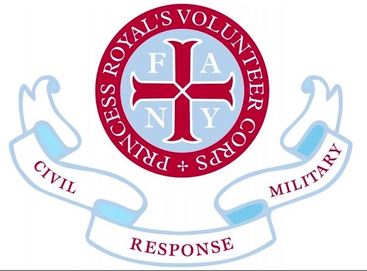Women's Transport Service
| First Aid Nursing Yeomanry (Princess Royal's Volunteer Corps) |
|
|---|---|

Cap badge of the First Aid Nursing Yeomanry
|
|
| Active | 1907–present |
| Country | United Kingdom |
| Branch | Independent |
| Type | Charity volunteers |
| Garrison/HQ | Rochester Row, London |
| Motto(s) |
Arduis Invicta ("In difficulties unconquered") |
| Engagements |
World War I World War II Operation Granby |
| Commanders | |
| Commandant-in-Chief | HRH the Princess Royal |
The First Aid Nursing Yeomanry (Princess Royal's Volunteer Corps) (FANY (PRVC)) is a British independent all-female registered charity formed in 1907 and active in both nursing and intelligence work during the World Wars. Although its members wear a military style uniform it is not part of the Regular or Army Reserve.
It was formed as the First Aid Nursing Yeomanry in 1907 as a first aid link between the field hospitals and the front lines, and was given the yeomanry title as all its members were originally mounted on horseback. Unlike nursing organisations, the FANY saw themselves rescuing the wounded and giving first aid, similar to a modern combat medic. Their founder, Sergeant Major, later Captain, Edward Baker, a veteran of the Sudan Campaign and the Second Boer War, felt that a single rider could get to a wounded soldier faster than a horse-drawn ambulance. Each woman was trained not only in first aid but signalling and drilling in cavalry movements. The original uniform was a scarlet tunic with white facings, a navy blue riding skirt with three rows of white braid at the bottom and a hard topped scarlet hat with black leather peak. In 1912 the uniform was changed to a khaki tunic, khaki riding skirt and later a khaki soft cap.
Leaders of FANY included Grace McDougall and Lillian Franklin.
During the First World War, Lieutenants McDougall and Franklin, arrived in Calais on 27 October 1914, but drove motor ambulances instead of horses. The British Army wanted nothing to do with them, so they drove ambulances and ran hospitals and casualty clearing stations for the Belgian and French Armies. By the Armistice, they had been awarded many decorations for bravery, including 17 Military Medals, 1 Legion d'Honneur and 27 Croix de Guerre. McDougall wrote an anonymous 1917 account of her experiences Nursing Adventures: A FANY in France, retitled A Nurse at War: Nursing Adventures in France for America.
...
Wikipedia
